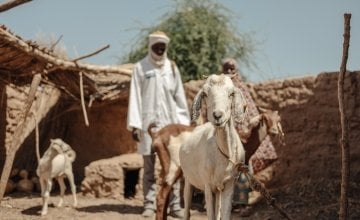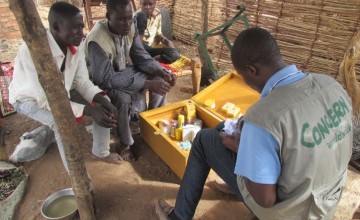
Read our 2024 annual report

Knowledge Hub
Concern's work on Pastoralism
This page outlines Concern's work and learning on pastoralism in Chad, Sudan, Niger and Kenya.

Pastoralism, in its various forms, such as nomadism, transhumant or agro-pastoralism, is an agricultural practice founded on extensive livestock breeding involving the movement of animal and people. This is a vital livelihood system in many regions across the world, particularly in dryland areas.
Pastoral systems are based on livestock production, which provides food, nutrition, income, and social status, among other benefits, to the people engaging in this livelihood system. In Africa, large populations across the Sahel, East Africa and the Horn of Africa practice pastoralism.
Concern has been supporting vulnerable pastoralist families in Chad, Sudan, Niger and Kenya through different interventions, such as restocking livestock, promoting vaccination campaigns, strengthening community-based animal health systems, and improving animal feeding, with the aim to protect livestock assets and maintain this livelihood system viable.
Supporting pastoralism in Chad

This study contributes to the understanding of the dynamics of pastoralism and farming in Dar Sila in relation to its natural, social, and economic environment.
The authors review the history of the development of pastoralism in Chad, look closely at pastoral systems in eastern Chad, review the policy and institutional context for pastoralism in Chad, and offer recommendations for practitioners working with pastoralist communities in Dar Sila and nationally in Chad. The study was originally conducted to inform and support the integration of pastoralism resilience building into the Concern Worldwide program in the Dar Sila Region.
It is also directly relevant to a range of audiences: those seeking an up-to-date and informed review of pastoralism in the eastern Chad context; those interested in the wider policy and institutional context and how to engage effectively in related processes to support the development of pastoralism; and those interested in building resilience in contexts such as the Sahel.
This latest research from the Feinstein International Center of Tufts University in Dar Sila (Chad), analyses seasonal patterns of and relationships between wasting, water contamination, and livestock management among communities around Goz Beida, with the aim of informing and influencing programs and policies that address persistent acute malnutrition in the region. The study identified “environment and seasonality” as a key trigger of the underlying and immediate drivers, mediated through livelihoods and institutions, and revealed that the seasonal patterns of child nutritional status adhere quite closely to the risks presented by the seasonal variability in rainfall and temperature in Sila Province.
Download resources
Supporting pastoralism in Kenya
Concern Kenya programme has been supporting vulnerable pastoralist households in Marsabit County by closely working with the Department of Livestock (DoL) and pastoralist communities with the aim of improving access to animal health services and the quality of veterinary drugs. Interventions included support to deliver mass vaccination campaigns against livestock diseases, establishing Participatory Diseases Surveillance (PDS) systems at community level with local pastoralists and Community Disease Reporters (CDRs).
Since 2017, through USAID-funding the programme has also launched an electronic voucher system called “E-Wallet” that has enabled most vulnerable pastoralist households to access high quality veterinary drugs and feeds from a range of accredited suppliers in a timely manner. Since then, the E-Wallet model has evolved its model and has further engaged with both public and private actors, such as Sidai Africa, a social enterprise offering a range of livestock products and services and Animal Health Service Providers, who are private animal health officers working closely with the public veterinary system. The current model is deemed more sustainable and able to provide reliable veterinary services in remote and underserved communities.
Some of the recent learning emerging from this multi-year livestock programming has been captured in a LEGS research entitled Operational Barriers to Applying LEGS conducted between 2017 and 2019 across three country programmes in Kenya, Ethiopia and Zimbabwe, and implemented by Concern Worldwide, Oxfam GB and IRC respectively. The Livestock in Emergency Guidelines and Standards (LEGS) is a companion standard to the Sphere Handbook and part of the Humanitarian Standards Partnership (HSP), and provides clear procedures for planning and implementing livestock interventions in humanitarian programming. The research explored potential models on the use of the local veterinary private sector that would allow the application of the LEGS standards, and within the quality assurance requirements by (donors) USAID/OFDA. The study highlights key learning and provide recommendations on how to improve Emergency Veterinary Voucher Schemes.
Download resources
Global webinar series on pastoralism
Concern, the Coalition of European Lobbies for Eastern African Pastoralism (CELEP), an informal network supporting pastoralism in Eastern Africa, and other CELEP’s members joined forces to deliver six online global webinars between September and December 2020 to discuss relevant topics around pastoralism:
- Understanding pastoralism and framing the argument for advocacy - CELEP/ Misereor
- Participatory Rangelands Management - Reconcile (Kenya)
- Addressing animal health challenges in pastoralist areas - VSF (Belgium)
- Pastoralism and conflict – Rethinking the phenomenon? - IIED (UK)
- Towards an enabling policy environment for African pastoralists - SNV (The Netherlands)
- How pastoralism adds to improved food security and nutrition - Concern Worldwide (Ireland)
This page covers aid activities implemented with the financial assistance of several donors, including Irish Aid, UK Aid and USAID. The ideas, opinions and comments herein are entirely the responsibility of the author(s) and do not necessarily represent or reflect the policies of any donors.




